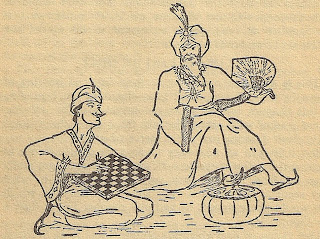Number Games
One of the most fascinating aspects of mathematics is that of unexpected results. For example there is the way things multiply with astounding speed once you start.
Thus there is this old story from India. In it a Vizier, (Prime Minister), to a King was asked to name his own reward. Now this Vizier had just invented the game of Chess and the King decided to reward him and in a fit of misplaced generosity asked him to name his own reward.
The Vizier a shrewd man and a bit of a bastard took out a Chess board and asked for the following. That he be given one grain of wheat for the first square on the board, two for the next square and 4 for the following and so forth until the last of the 64 squares.
The King apparently thinking that he got off cheap fetched a bag of wheat grain. Soon however he ran out of grain in the bag and then with mounting horror the King realized that all the grain in his kingdom could not satisfy this request. In fact all the wheat production on earth in the last 1000 years would not satisfy this promise. In fact it amounts to 18,446,744,073,709,551,615 grains!1
I leave the likely terrible fate of the Vizier to your imagination.
A second example is the old Temple of Benares story.
In this temple there are three golden rods ½ half long. Around one of the rods there are 64 disks going from largest at the bottom to smallest at top. 24 hours a day, every day, a Priest moves one disk at a time to another rod, without ever having a larger one over a smaller one. The Priests (They take shifts), moves one disk a second. When all 64 disks are moved the Universe will cease to exist. So how long will it take?
Well the same pyramiding that happens with the grains of wheat on a chess board doubling with each square happens here. The number of moves required doubles in the same fashion. The result is the same number of seconds as the grains of wheat owed to the Vizier, 18,446,744,073,709,551,615, which converted to years is 58 thousand billion years!2
And a final mathematical story.
How about a machine that randomly generates English sentences. The machine consist of 65 wheels, each wheel having 50 symbols, (The 26 letters and things like commas, periods, blank etc.) There are 65 wheels because that is the average length of an English sentence. In theory this machine could randomly generate every sentence that has, is or will be written in English. So how long will it take to produce everything that could be written?
Well if every atom in the Universe was this machine and they had been going since the origin of the Universe they would have produced c. 1/30 of 1% of the total number of sentences possible and this is with the constraints mentioned above regarding sentence length etc.3
That is just some examples of unexpected results from playing with numbers.
1. Gamow, George, One Two Three… Infinity, Second Edition, Bantam Books, New York, 1961, pp. 7-8.
2. IBID, pp. 9-11.
3. IBID, pp. 11-14.
Pierre Cloutier



No comments:
Post a Comment